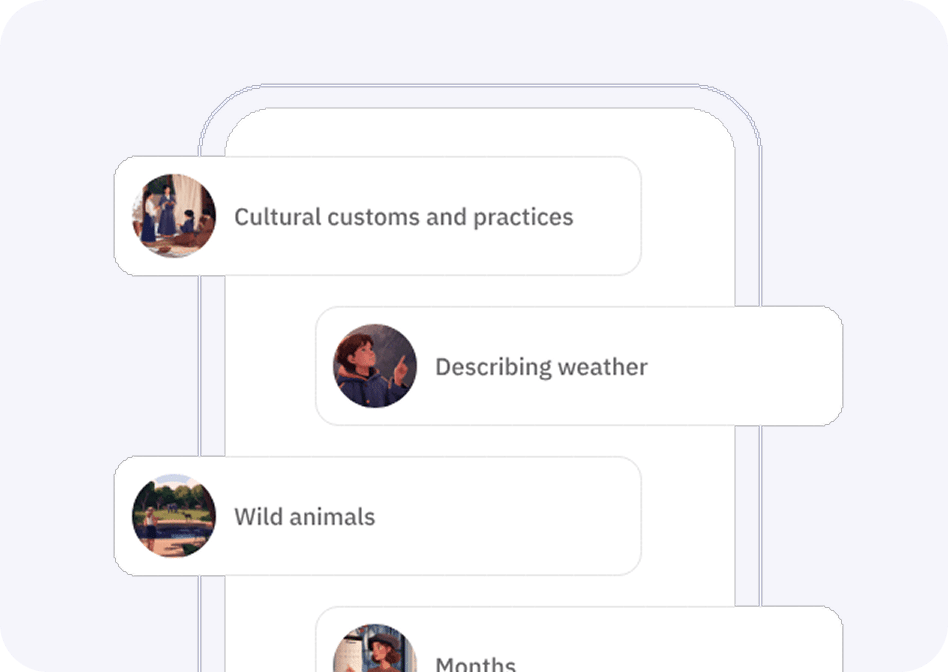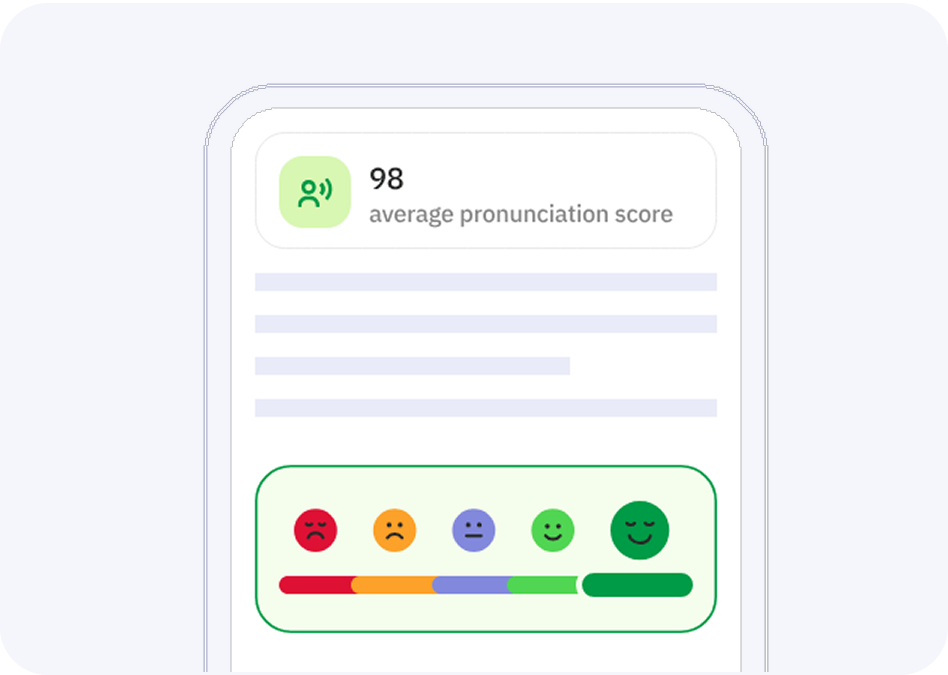Spoken German Practice With AI
Mastering German requires more than just understanding grammar and vocabulary; the key to true proficiency lies in effective spoken German practice. Engaging consistently in conversation helps learners develop their speaking skills, boost confidence, and enhance their ability to think in German. Whether you’re a beginner or at an intermediate level, incorporating spoken language practice into your learning routine is crucial. One innovative tool that supports this aspect of language learning is Talkpal AI, which provides interactive sessions tailored to your skill level. This page delves into various aspects and benefits of spoken German practice, offering insights and tips to help you advance your verbal communication skills in German.

The talkpal difference

Personalized Education
Everyone absorbs information differently. By utilizing Talkpal's advanced capabilities, we analyze the study habits of millions of users at once to build highly effective educational environments that adapt to the specific needs of every student.

Cutting-Edge Technology
Our main mission is to lead the way in providing accessible and tailored educational journeys for everyone by leveraging the most recent breakthroughs in modern innovation.

Making Learning Fun
We have transformed education into an entertaining activity. Since staying motivated can be difficult in a digital setting, we designed Talkpal to be incredibly captivating so that users actually prefer building new communication skills over playing video games.
LANGUAGE LEARNING EXCELLENCE
The most efficient way to learn a language
Try Talkpal for freeIntroduction to Spoken German Practice
1. The Importance of Consistent Practice
Consistent practice is crucial in mastering any language, and this holds especially true for German. Spoken German practice allows learners to familiarize themselves with the nuances of pronunciation, intonation, and rhythm unique to the language. Regular interaction in German helps to solidify vocabulary and grammar structures, making them second nature during conversations. Tools like Talkpal AI can offer daily practice opportunities, simulating real-life interactions that can dramatically improve language skills over time. Moreover, consistency helps in reducing the anxiety and hesitation often associated with speaking a new language, making the learning journey smoother and more enjoyable.
2. Engaging in Real-Life Conversations
There’s no substitute for real-life conversations when it comes to spoken German practice. Engaging with native speakers or fellow learners in natural settings exposes you to colloquial phrases and slang, enhancing your cultural understanding and linguistic competence. However, not everyone has access to native speakers or a German-speaking community. This is where tools like Talkpal AI come in handy, providing an interactive platform where learners can engage in guided conversations that mimic real-life scenarios. By using such tools, you can gain the confidence needed to speak in diverse situations, from casual chats to more formal discussions.
3. Personalized Learning with AI Tools
Incorporating AI tools like Talkpal AI into your language learning routine can significantly enhance your spoken German practice. These tools use sophisticated algorithms to adapt to your learning pace, focusing on areas that need improvement. Personalized feedback on pronunciation and grammar provides insights into your speaking abilities and helps refine your skills. Moreover, AI tools can help simulate various conversational scenarios, from ordering food in a restaurant to discussing business, which are critical in applying language skills in everyday situations.
4. Cultural Immersion through Language
Understanding the cultural context of a language is as important as mastering its structure. Spoken German practice offers a window into German culture, social etiquettes, and traditions. Tools like Talkpal AI often incorporate cultural lessons that complement language learning, making the experience richer and more comprehensive. Engaging with these cultural nuances can improve your comprehension and make interactions with native speakers more meaningful and respectful, thereby enriching your overall learning experience.
5. The Role of Feedback in Language Learning
Feedback is a vital component of learning any language effectively. In spoken German practice, receiving immediate and constructive feedback can make a significant difference. Tools like Talkpal AI can provide instant feedback on pronunciation, word choice, and grammar, allowing learners to make quick adjustments and improve in real-time. This ongoing feedback loop helps to build confidence and encourages continuous learning and improvement, key aspects of mastering spoken German.
6. Vocabulary Expansion through Conversation
Regular spoken German practice naturally leads to an expansion of vocabulary. Engaging in diverse conversations exposes you to new words and phrases, which become easier to remember when used in context. Tools like Talkpal AI can introduce you to vocabulary relevant to your interests and daily life, making learning both practical and enjoyable. This contextual learning not only enriches your language skills but also enhances your ability to express complex ideas and emotions in German.
7. Practicing Pronunciation and Intonation
Pronunciation and intonation are critical in spoken German, as minor variations can change meanings and affect comprehensibility. Regular practice helps you hone your accent and better understand the rhythmic flow of German. Using tools like Talkpal AI, learners can listen to native pronunciation and practice repetitively until they achieve the right intonation and rhythm. This practice is indispensable, particularly for those preparing for oral exams or planning to live in a German-speaking country.
8. Overcoming Language Anxiety
Many language learners experience anxiety when speaking a new language. Spoken German practice through simulated environments like those offered by Talkpal AI can help mitigate this anxiety. By practicing in a controlled, stress-free environment, learners can build confidence gradually. As confidence grows, the anxiety associated with speaking decreases, allowing for more fluid and spontaneous use of the language in real-world situations.
9. Measuring Progress in Speaking Skills
One of the challenges of self-taught language learning is measuring progress, particularly in speaking skills. Regularly engaging in spoken German practice with tools like Talkpal AI allows for consistent tracking of improvements. These platforms often have assessment features that measure your fluency, accuracy, and complexity of language use, providing clear indicators of your progress and areas needing further development.
10. The Future of Learning German: AI-Enhanced Practice
As technology advances, tools like Talkpal AI are set to become even more sophisticated, providing learners with increasingly effective and personalized language learning experiences. The future of learning German looks promising with AI-enhanced practice methods that offer immersive, interactive, and adaptive learning environments. This can dramatically accelerate the learning process, making fluency more attainable for learners across different levels and backgrounds.
The most efficient way to learn a language
Try Talkpal for freeFrequently Asked Questions
What is the best way to practice spoken German?
How often should I practice speaking German to become fluent?
Are there specific topics I should focus on when practicing spoken German?
What are common challenges people face in spoken German practice, and how can they overcome them?







